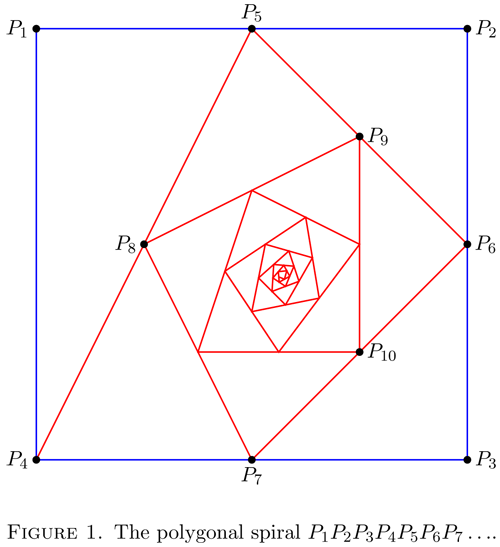Chris L T521
Gold Member
MHB
- 913
- 0
Thanks again to those who participated in last week's POTW! Here's this week's problem!
-----
Problem: Starting with the vertices $P_1(0,1)$, $P_2(1,1)$, $P_3(1,0)$, $P_4(0,0)$ on a square, we construct further points as shown in the figure below: $P_5$ is the midpoint of $P_1P_2$, $P_6$ is the midpoint of $P_2P_3$, $P_7$ is the midpoint of $P_3P_4$, and so on. The polygonal spiral path $P_1P_2P_3P_4P_5P_6P_7\ldots$ approaches a point $P$ inside the square.

a) If the coordinates of $P_n$ are $(x_n,y_n)$, show that $\frac{1}{2}x_n + x_{n+1} + x_{n+2} + x_{n+3} = 2$ and find a similar equation for the $y$-coordinates.
b) Find the coordinates of $P$.
-----
-----
Problem: Starting with the vertices $P_1(0,1)$, $P_2(1,1)$, $P_3(1,0)$, $P_4(0,0)$ on a square, we construct further points as shown in the figure below: $P_5$ is the midpoint of $P_1P_2$, $P_6$ is the midpoint of $P_2P_3$, $P_7$ is the midpoint of $P_3P_4$, and so on. The polygonal spiral path $P_1P_2P_3P_4P_5P_6P_7\ldots$ approaches a point $P$ inside the square.

a) If the coordinates of $P_n$ are $(x_n,y_n)$, show that $\frac{1}{2}x_n + x_{n+1} + x_{n+2} + x_{n+3} = 2$ and find a similar equation for the $y$-coordinates.
b) Find the coordinates of $P$.
-----